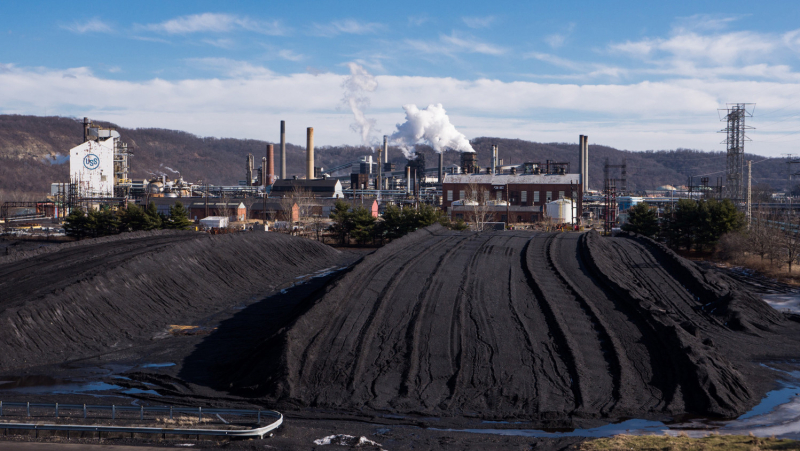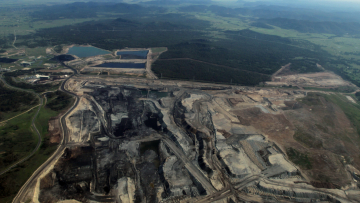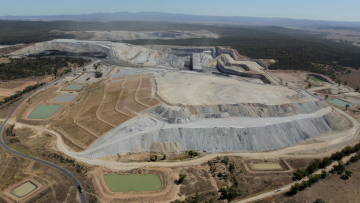Metallurgical coal flush with nearly $22 billion from banks, over $30 billion in investments
Lia Wagner, GCEL Research,
lia.wagner@urgewald.org
Dr. Ognyan Seizov, International Communications Director, ognyan.seizov@urgewald.org, +49 (0)30 863 2922-61

Lia Wagner, GCEL Research,
lia.wagner@urgewald.org
Dr. Ognyan Seizov, International Communications Director, ognyan.seizov@urgewald.org, +49 (0)30 863 2922-61
A new report from German environmental and human rights NGO Urgewald exposes how major financial institutions continue to bankroll the expansion of metallurgical coal (“met coal”), despite global coal phase-out commitments.
The report, Still Burning: How Banks and Investors Fuel Met Coal Expansion, finds that banks provided $21.96 billion in loans and underwriting to met coal developers between 2022 and 2024, while institutional investors held $30.23 billion in securities of companies expanding coal mining operations.
Although many financial institutions have pledged to end coal financing, most of these commitments do not cover metallurgical coal — the type used in steelmaking — creating a dangerous loophole that undermines global climate goals. Met coal accounts for roughly 11% of global CO₂ emissions.
“Met coal fuels the climate crisis just the same as thermal coal,” says Lia Wagner, met coal expert at Urgewald. “Banks and investors that ignore this fact are financing the destruction of our planet’s carbon budget.”
Urgewald’s Metallurgical Coal Exit List and the full report on met coal’s financiers can be accessed at: coalexit.org/mc.
China and the US lead met coal financing
According to the new report, 201 banks worldwide have financed metallurgical coal developers in recent years. Chinese banks dominate, accounting for 67% of global met coal financing or approximately $14.7 billion between 2022 and 2024. China Everbright, CITIC, and CSC Financial top the list of financiers, driven by the country’s massive blast-furnace steel industry.
The United States follows as the second-largest source of funding, contributing $3.04 billion over the same period. Jefferies Financial Group leads American financiers, increasing its met coal funding by nearly 400% since 2022. In 2024, Jefferies, alongside KKR Group and Deutsche Bank, arranged a $2 billion loan to Peabody Energy, the US coal giant attempting to expand its metallurgical coal operations before canceling a major acquisition following mine fires in Queensland, Australia.
“Even as the market signals decline, US financiers are clinging to met coal,” said Wagner. “None of this is about protecting steelworkers — it’s about cornering short-term profits.”
Europe’s double standard
Despite touting climate leadership, European banks collectively funneled $1.54 billion into met coal developers over the past three years. Deutsche Bank, BNP Paribas, Santander, and Crédit Agricole rank among the top financiers. Many of them previously claimed to end support for new met coal projects.
A significant portion of European financing has gone to Glencore, whose mountaintop-removal mining operations in British Columbia have poisoned waterways and devastated ecosystems. Although Deutsche Bank and UBS publicly pledged to avoid supporting the practice of mountain top removal, both have provided financing to Glencore.
“It’s hypocritical for European banks to brag about thermal coal phase-outs while secretly funding met coal mining,”says Cynthia Rocamora from Reclaim Finance.
Japan and Australia sustain coal’s lifeline
Over the reporting period, Japanese banks invested $1.22 billion in metallurgical coal developers, with Mitsubishi UFJ, Mizuho, and SMBC Group leading the charge. Japan’s steel giants, Mitsubishi Corporation and Nippon Steel, are expanding coal mines in Australia, even as they push “green transformation” campaigns.
Australia’s banks and investors remain major players as well, with $644 million in financing to domestic coal producers. Petra Capital and ANZ top the list, helping companies like Stanmore Resources and BHP extend coal mining well into the next century.
“ANZ’s coal policy is not acceptable in the midst of a climate crisis,” says Adam Currie of 350 Aotearoa. “While the bank talks about environmental responsibility, its policies contain carefully crafted loopholes that continue to permit production and expansion of metallurgical coal.”
Investors hold the keys to coal’s future
While banks keep the money flowing, institutional investors are propping up the industry. As of July 2025, investors hold $30.23 billion in securities of companies expanding metallurgical coal operations. U.S. investors dominate this list, with $17.04 billion in holdings.
The world’s top five met coal investors are: Vanguard ($3.33 billion), BlackRock ($3.05 billion), State Street ($1.97 billion), Berkshire Hathaway ($797 million), and Japan’s Government Pension Investment Fund (GPIF) ($733 million).
Collectively, these institutions control nearly one-third of global met coal investments. The GPIF, the world’s largest pension fund, has come under fire for investing in companies such as Mitsubishi, Glencore, and Coal India, despite adopting a “sustainability-conscious” investment strategy earlier this year.
Similarly, Australia’s largest pension fund, AustralianSuper, has dramatically increased its stake in Whitehaven Coal, now holding 8.47% of the company’s shares. Whitehaven is behind two of Australia’s most environmentally destructive coal projects — Blackwater South and Winchester South — which threaten thousands of hectares of koala habitat.
A call to action
Urgewald’s report warns that continued met coal financing and investment are incompatible with a 1.5°C climate pathway. As the EU’s Carbon Border Adjustment Mechanism comes into effect and green-hydrogen steelmaking gains ground, the era of coal-based steel is as good as finished.
“The time for excuses is over,” says Wagner. “Financial institutions must close the metallurgical coal loophole once and for all because, simply put, coal is coal.”



